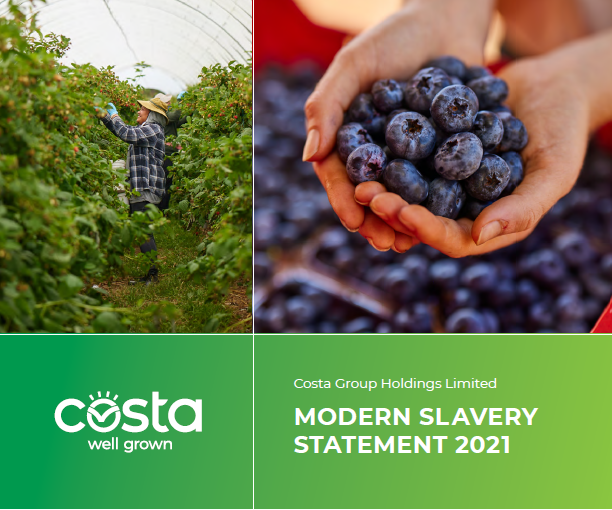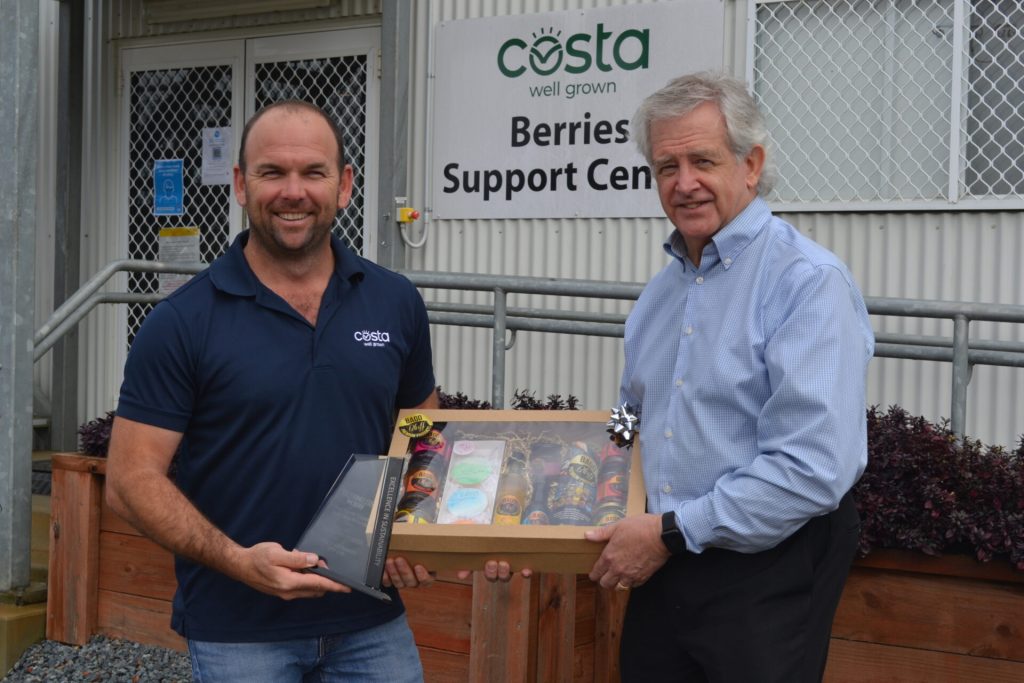Modern Slavery Statement 2021

As Australia’s leading producer of fresh fruit and vegetables and with international operations in China and Morocco, ensuring human rights are not only protected but also taking action to prevent modern slavery is fundamental to our business. Our second Modern Slavery Statement, covering the financial year ending on 26 December 2021, outlines both the activity […]
Super sweet strawberries hit supermarket shelves

Costa Berries Tasmania in partnership with Driscoll’s Australia is undertaking a commercial trial of a new super sweet strawberry variety, Driscoll’s Zara. Costa Berries Tasmania Regional Manager Cameron Folder said: “The Zara variety of strawberry has been in production at our East Devonport strawberry farm as an on-farm commercial trial since the start of our […]
Sustainability Report 2021

Costa Group Holdings Limited, Australia’s leading grower, packer and marketer of fresh fruit and vegetables, has released its 2021 Sustainability Report. Our 2021 Sustainability Report provides key data on our actions across our key Sustainable Commercial Farming pillars of the Environment, Economic, People and Community. Key highlights in the report include:• Commitment to achieving net […]
Scam alert

Costa has been made aware of fraudulent scam letters being sent to people which purport to offer the person in receipt of the letter an unsolicited job with Costa. The letters may also seek a payment from the recipient in exchange for the person being offered the job. Please be aware that Costa does not […]
Costa rallies for Tongan colleagues

With a large contingent of Tongan employees, Costa has rallied to provide funds and goods to support the relief effort in the wake of the devastating earthquake and tsunami which hit the island nation in January. The Costa business committed $25,000 to the relief effort and, in collaboration with Coles, has coordinated a shipping container […]
Minister opens $80 million tomato glasshouses

Costa’s $80 million expansion of its tomato glasshouse operation at Guyra was formally opened today (December 3) by The Honourable Adam Marshall, Member for Northern Tablelands and Minister for Agriculture and Western New South Wales. The expansion includes two new five-hectare glasshouses and a 2.5-hectare propagation nursery at the New England Highway site, just north […]
Tasmania berry season kicks off

Costa Berries Tasmania today (November 17) launched its local recruitment campaign for the 2021/22 harvest season. Costa Berries Tasmania General Manager Cameron Folder was joined by Guy Barnett, Minister for Primary Industries and Water, at the East Devonport Strawberry Farm. Mr Folder said the aim of the campaign was to build upon the success of […]
AFPA Statement on the variation of the Horticulture Award 2021

The Fair Work Commission has handed down a decision to vary the Horticulture Award to ensure that all pieceworkers must be paid a minimum hourly rate in accordance with the employee’s classification and type of employment. The Commission’s decision has set a clear and enforceable standard for employers in the industry. The Commission’s decision relies […]
Excellence in Sustainability Award

Costa’s Berry farm in Corindi has won the 2021 Excellence in Sustainability Award in the Mid North Coast NSW Business Awards. The Excellence in Sustainability Award recognises a business that has demonstrated its commitment to sustainable business practices and is working to reduce the impact of its operations on the environment. Winners of the Awards, […]
China JV earns Impact Award

Costa and Driscoll’s joint venture blueberry operation in China has won this year’s Impact Award in the Asia Fruit Awards, announced this week. The joint venture, which was established in 2015, includes close to 300 hectares of blueberries in the Yunnan Province in southern China. The Impact Award recognises a person, company or organisation that […]